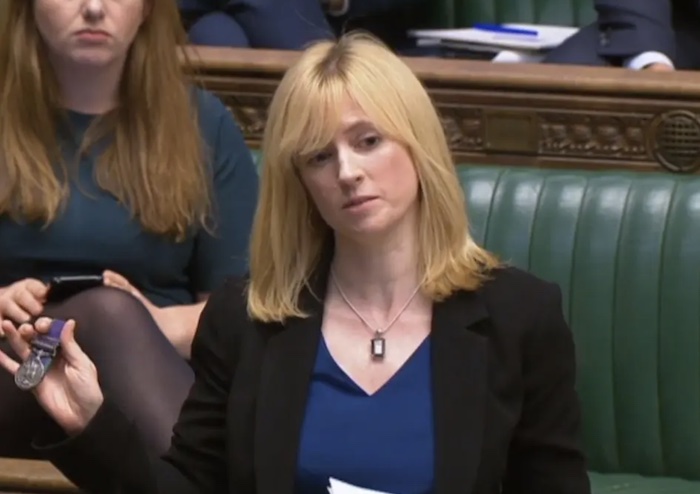Should a candidate feel forced to pull out of public hustings events because of concerns about their safety? No, of course not, though that’s exactly what our current political culture has caused Rosie Duffield to do. One of her own Labour party colleagues, Lord Cashman, had the whip suspended after he suggested she was ‘frit or lazy’ for doing this. He has since apologised, but this is just the latest in a whole series of incidents where Duffield has been attacked by her own side side.
Duffield spoke to Andrew Neil on Times Radio today. She spoke about an ongoing failure from her own party leadership to, until relatively recently, give her much support. She explained her decision to pull out of those hustings:
I knew that a particular group of mostly former Labour members were going to stage a few noisy protests against me and they did when I had my campaign launch and that’s their right, that’s ok, the police and my security team kept me and my guests safe but it just got to the stage where this sort of incitement was just too much, people saying “let’s get Duffield at this event” or whatever. I think I realised that those public events like hustings, if those people kept on following me around and telling, it would really damage the whole process of giving everybody on that platform a voice, and I’ve done those hustings lots and lots of times before, I’ve usually really enjoyed them, but some of my fellow candidates haven’t ever had the chance to do that. I felt that they deserved the right to be able to speak freely without being yelled at by a few really vitriolic people.
Duffield is by no means the only female MP to have a security team and police assistance: as she said, it’s ’quite normal’ now. That’s depressing enough, but her particular case largely involves people who, in other circumstances, would be very much on her part of the political spectrum. Former Labour members are harassing her. A Labour peer is mocking her.
We often talk about the polarisation of our political discourse as though the two poles are the traditional right and left. But the most gaping divisions are not between people with different views on the benefits bill, or the size of the state, or how much money should go to the NHS. They are between positions on single issues, which is why Duffield has found much support from Conservative MPs who have similar views on gender issues. She said the LGBT Labour group had been very noisy. Lots of colleagues, meanwhile, had been supportive but ‘terrified’ of having a similar experience to Duffield. ‘Nobody wanted to speak out if they agreed with me in the party.’
Duffield was clear that ‘I’m not blaming the leader for that at all.’ But none of the party leaders have helped on this matter. Rishi Sunak has often seen the debate about sex-based rights as something to joke about, while Keir Starmer spent months avoiding a debate he complained was ‘toxic’ without acknowledging that as a political leader, he might have some power to influence its tone.
None of the party leaders have helped on this matter
Duffield told Neil about a ‘domino’ effect after Starmer’s initial pronouncement on Duffield saying that only women had a cervix. ‘That’s wrong,’ he said, with frontbencher after frontbencher repeating the line. It took her a long time to get a meeting with him, though she did see the Labour leader a few months ago, not long before the election was called, to discuss her concerns about recent defections to the party (she was particularly concerned that Natalie Elphicke had been allowed to join given her conduct during the sexual assault trial of her former husband Charlie). She said ‘I’ve now been reached out to by someone in his team, someone messaged me this morning, and a member of staff has been keeping an eye on I guess the news and making sure I’m OK.’ But she wasn’t invited to the Labour election campaign launch in Kent, even though she is its only incumbent MP.
Debates about sex and gender were never going to be devoid of emotion, but a failure of political leadership has meant that only people who are as brave as Duffield have felt comfortable to speak out. The Cass report has certainly emboldened many more politicians to say what they thought anyway about biological sex – but it really shouldn’t have taken this long for Duffield’s colleagues to find their voice. By leaving her alone for so long, they have made the debate much harder for everyone. And not just this particular issue, as it happens. The message from Duffield’s experience is that if you are a woman in politics, you’d better think really long and hard before you dare stick your neck out on issues you really care about – and not because people will argue with you, but because they’ll threaten you. What a way to undermine rational policy making and make politicians even more likely to make stupid decisions.








Comments